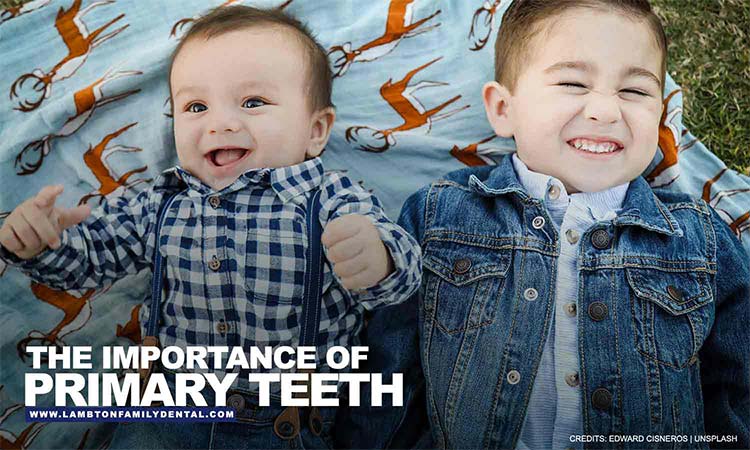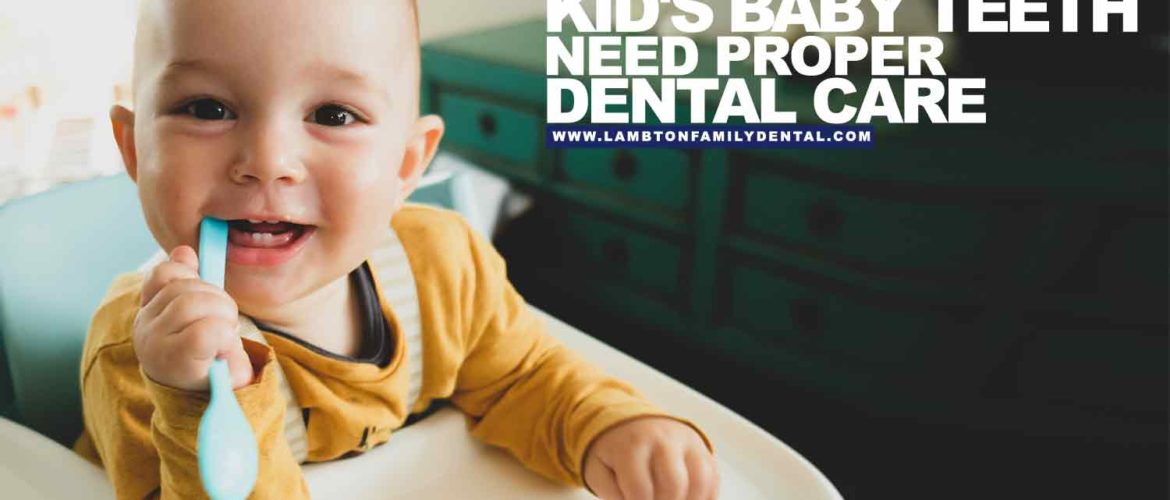Encouraging proper dental health for kids is one of the most important things parents can impart to their children. It can be tricky, especially because children are often afraid of dentists and would choose to eat sweets over brushing their teeth before bed. What’s a parent to do?
Take reading this as your first step. Understand how your child can benefit from proper dental care and know when to start cleaning baby teeth to help them develop proper dental hygiene habits.
The Importance of Primary Teeth

Everyone will have two sets of teeth in their lifetime — the primary set, which appears a few months after birth and lasts until mid-childhood, and the permanent ones. The smaller jaw size of children can only accommodate 20 teeth while adult jaws can accommodate 32.
Children aren’t born with a full set of teeth. The primary teeth will begin to grow when they are 10 to 29 months of age. Primary teeth erupt following this sequence:
- Incisors come out at around 10 months after birth.
- The canines come out when the child is 19 months old.
- The first molars come out when the baby is one and a half years old.
- The second molars come at a little after the child turns two years of age.
During this stage, most children will still be consuming soft food. However, their primary teeth will already be performing a vital function in terms of digestion.
Primary (or baby) teeth are crucial factors in the development of teeth and gums. While it’s true that primary teeth will eventually be replaced with permanent teeth once your child turns six years and older, that doesn’t mean they should be neglected.

Caring for the health of baby teeth is important because they:
- Act as placeholders for permanent teeth – Children who lose baby teeth prematurely may need an oral device as a substitute placeholder for permanent teeth. Without a tooth or a device to occupy the empty space, adjacent teeth can lean toward it, resulting in misalignment when permanent teeth start to grow.
- Allow your child to chew and bite – This will allow them to easily transition to solid food.
- Play a role in speech development – Teeth control the flow of air when speaking. Together with the tongue and lips, baby teeth will allow your child to form words and develop their ability to speak.
- Impact your child’s smile – Teeth are part of the overall framework that determines facial features. Healthy teeth also mean a healthy smile, which will influence your child’s self-confidence as they grow older.
Tips for Caring for Your Child’s Teeth

Because the mouth is the gateway to a healthy body, you need to educate and set a good example for your children by teaching them the proper way of caring for their teeth.
It’s Never Too Early
Baby teeth can start erupting as early as six months old. Start cleaning your child’s tooth as soon as they appear.
No Fluoride for Babies
One thing that’s as important as knowing when to start cleaning baby teeth is the knowledge of what products to use. Fluoride plays a significant role in helping to prevent tooth decay and the formation of cavities. Using fluoride products can also strengthen the enamel of the teeth.
However, fluoride toothpaste should only be used for older children, not babies. Younger kids have a tendency to swallow toothpaste. Primary teeth should be wiped or washed with a washcloth. On the other hand, you can use non-fluoride toothpaste which, if swallowed, is safe for children.
As your child grows older, start to incorporate the use of fluoride toothpaste to enhance their brushing routine.

Good Habits Are the Key to Healthy Teeth
Establishing your child’s dental hygiene habits while they still have their baby teeth sets the tone for how they treat their permanent teeth.
One surefire way to preserve children’s oral health is for them to develop good habits. Be a role model for your children and observe healthy dental habits including:
- Brushing twice a day for at least two minutes.
- Not sharing utensils used by you or older children since this can cause the spread of bacteria and tooth decay.
- Seeing the dentist every six months.
It’s the Germs, Not the Food
It may be tempting to simply prevent your child from eating candy and other sweets, but food is not the primary cause of tooth decay. This is caused by germs. The food you eat doesn’t matter as much as proper hygiene. Plaque, which leads to tooth decay, is bacteria buildup on teeth. Cleaning your child’s teeth will keep bacteria from establishing a colony in teeth, keeping plaque and tooth decay at bay.
Flossing Matters
At the age of two to three, children’s molars will begin to drift closer to each other. This can make it easier for food to get stuck in between teeth while making teeth more difficult to clean. For this reason, flossing should be introduced as a necessary step to clean teeth thoroughly. Dentists recommend regular flossing to get rid of these. Teach your children the proper flossing techniques so as not to irritate the gums.
Cavities Can Cause Other Issues
Cavities – also known as dental caries or tooth decay – are among the most common chronic diseases in children. If these are left untreated, children could suffer from pain and infections. It can also increase the risk of tooth decay. Studies found that 1 out of 5 children (5 to 11 years old) have at least one untreated tooth decay.
Children experiencing pain and tooth decay can develop problems when eating, playing, speaking, and learning. Research has also shown that children with poor oral health get lower grades and miss more school days compared to kids who don’t.
Fortunately, you can help your child avoid these issues. Paying your dentist a visit will allow you to protect your children from dental caries and problems that may stem from cavities.

Your child’s smile is precious. It’s crucial that you find a dental professional that will give your child the dental care they need. Lambton Family Dental offers dental care for the whole family – from children to the elderly — allowing you to cater to your dental needs together with your kids. This will help your children understand how important oral health is.
Schedule an appointment with us by calling (519) 344-5747 or by visiting our office at 387 Exmouth St., Sarnia, ON.

